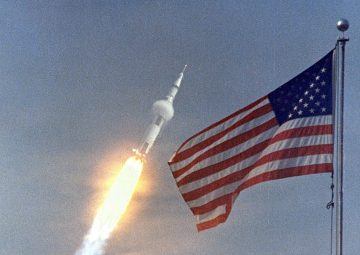Kyle L. Evanoff in the Bulletin of the Atomic Scientists:
 A moonshot is on the rise on the Trump administration’s foreign policy agenda. At last month’s meeting of the National Space Council in Huntsville, Alabama, Vice President Mike Pence laid out an ambitious goal: “Return American astronauts to the moon in the next five years”—a date which would be well ahead of the 2028 target envisioned in previous NASA plans. The United States and China are locked in a new space race, he warned, and the stakes have only increased since the US-Soviet space race of the 1960s; the United States must be first to send astronauts to the moon in the twenty-first century.
A moonshot is on the rise on the Trump administration’s foreign policy agenda. At last month’s meeting of the National Space Council in Huntsville, Alabama, Vice President Mike Pence laid out an ambitious goal: “Return American astronauts to the moon in the next five years”—a date which would be well ahead of the 2028 target envisioned in previous NASA plans. The United States and China are locked in a new space race, he warned, and the stakes have only increased since the US-Soviet space race of the 1960s; the United States must be first to send astronauts to the moon in the twenty-first century.
Pence framed putting American boots on the lunar ground as a national imperative. Invoking China’s successful landing of a probe on the far side of the moon earlier this year, he suggested that Beijing has “revealed their ambition to seize the lunar strategic high ground.”
“The lunar South Pole holds great scientific, economic, and strategic value,” according to Pence, and failure to put “American astronauts, launched by American rockets, from American soil” there is “not an option.”
The vice president’s antagonistic rhetoric fails to cohere with the realities of contemporary space exploration and the dictates of sound policy making.
More here.
